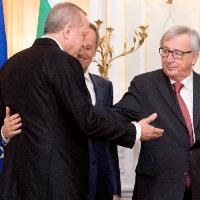(VARNA, BULGARIA) – EU leaders conveyed continued concern over the rule of law in Turkey Monday, as Turkey’s president Recep Tayyip Erdogan joined them for a wide-ranging discussion on EU-Turkey relations and the way ahead.
On the agenda for the meeting, hosted at the at the Evksinograd residence in Varna by Bulgaria’s prime minister Boiko Borissov for the EU presidency, were cooperation on the management of migration flows, shared interest in combating counter-terrorism, the rule of law in Turkey, Turkey’s recent actions in the Eastern Mediterranean and Aegean Sea and Turkey’s involvement in Syria.
“Our meeting today demonstrated that while our relationship is going through difficult times,” said EU Council president Donald Tusk, “in areas where we do cooperate, we cooperate well. We reconfirm our readiness to keep up the dialogue and consultations and to work together to overcome current difficulties with a view to unleashing the potential of our partnership.”
On migration, both sides agreed to continue close cooperation on migration. The EU has reiterated its commitment to offering further support intended to improve the situation of refugees in Turkey.
”I would like to express our appreciation for the impressive work Turkey has been doing, and to sincerely thank Turkey and the Turkish people for hosting more than 3 million Syrian refugees these past years”, said Mr Tusk.
On Syria, the EU voiced its concerns with Turkey’s actions in Syria, especially in the north-western region of Afrin, which is now controlled by the Turkish military and its allies.
In this context the EU asked Turkey to ensure the protection of civilians and ease access for humanitarian aid.
The EU side expressed concerns about Turkey’s recent actions in the Eastern Mediterranean and Aegean Sea, which the last EU summit in Brussels called ”illegal”.
They also recalled Turkey’s obligation to respect good neighbourly relations and normalise relations with all EU member states. This is the condition to move forward EU-Turkey relations, including the accession process.
”The European Union stands united behind the Republic of Cyprus”, said EU president Tusk.
Leaders also discussed Turkey’s actions in the aftermath of the July 2016’s attempted coup. They said they understood Turkey’s need to ensure its security. However, they underlined that as an EU candidate country, Turkey committed to upholding the highest standards of democracy.
”We are concerned that some of the methods used, undermine fundamental freedoms and the rule of law in Turkey’, said Mr Tusk.
The EU has asked Turkey to work with the Council of Europe, the Strasbourg-based pro-democracy and human rights organisation, to address the failings.



